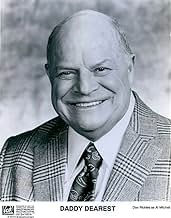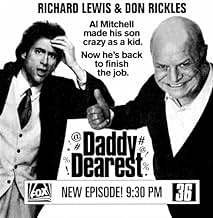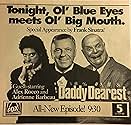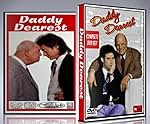O pai cínico e irritado de um pai solteiro vai morar com ele. O resultado é hilário.O pai cínico e irritado de um pai solteiro vai morar com ele. O resultado é hilário.O pai cínico e irritado de um pai solteiro vai morar com ele. O resultado é hilário.
- Prêmios
- 1 indicação no total
Explorar episódios
Enredo
Você sabia?
- CuriosidadesAs he confirmed on "Victory: The Podcast," Kevin Connolly was fired from the show during rehearsals.
- ConexõesReferenced in The Larry Sanders Show: Life Behind Larry (1993)
Avaliação em destaque
A television series often tries to become attractive to multi-generations. The thinking is that if a show has appeal to more than one group, it could become a bigger hit. So, why not get two comedians from different eras and build a sitcom around them?
Don Rickles had a really unique career, one that certainly couldn't be duplicated today. As an insult comic, he continually made fun of everyone's everything but his delivery and his attitude is what made it work. "Mr. Warmth," as he was affectionately known, would skewer celebrities, politicians, friends and total strangers, right to their faces, and he frequently had the chance, as Rickles was a popular guest on the talk shows and often appeared on the Dean Martin Celebrity Roasts from the MGM Grand Hotel in Las Vegas.
Mr. Rickles had tried numerous times to have a successful sitcom, and there were all sorts of premises, with none of them working out. That might have been because he was just too well established in his role. Everyone knew what they were going to get with a Rickles comedy routine. And if you weren't going to get that from him, why would this guy be getting cast in the role?
Richard Lewis was the ultimate self-deprecating comic, constantly putting himself down in his act. He was, for all intents and purposes, the exact opposite of Rickles. Pair these two up and let the hilarity take over!
The show's theme song was a mimicked cover version of the Benny Goodman signature tune: "Sing, Sing, Sing" A little something for the older folks watching. And the show's title was a play on the Christina Crawford memoir turned Faye Dunaway biopic of Joan Crawford, "Mommy Dearest."
Here, Lewis was Dr. Steven Mitchell, a psychologist, which put him in charge of everything, a little something for the younger generation to admire. Though the problem was that the good doctor had just gotten divorced and is on the make, this, despite his younger son Larry (Carey Eidel) living with him.
Of course, Dr. Mitchell's dad was Al Mitchell, our Mr. Rickles, a retired used car salesman, who is having a trial separation from Steven's mother (Renée Taylor) and Al had to move in with Steven, yet another impediment to romantic bliss for the doctor.
Obviously, with the psychological themes going on here, there was a lot of comedy to mine, or at least lots of Freudian jokes available. And Rickles always had to do the insult comedy so there was a hefty dose of that.
New York plays a part because you have to be a little crazy to live here, so there were plenty of patients for Dr. Mitchell to treat, and his parental issues were so deep and wide, they made the Hudson River seem like a tiny stream. Also, the fast paced attitude only meant that there was just a lot of mouthing off happening, non-stop.
The problem the show had was in not filming before a live studio audience. The show had canned laughter and canned applause, straight out of a late 1960s sitcom, and it was unmistakable and more than a little distracting. Perhaps, at this stage of his career, Don Rickles couldn't reliably be counted on to perform a script well, as the show did appear to be pretty heavily edited throughout each episode.
I can't say that was the only problem, because the show really hurled the anger back and forth, with both Ms. Taylor and Mr. Rickles continually bickering while Mr. Lewis had to sit back and watch them dismantle each other and their sex lives (there's Dr. Freud, as promised). The attacks weren't even that funny more than they were designed to harm the other person as two estranged partners might actually do.
Even so, nobody was doing insult comedy at this point in TV history, and certainly not with the extra zeal of a Don Rickles level takedown, or Renée Taylor punching back with that same level of power.
Despite the excuse to have a string of starlets and models coming through to be on dates with either Steven or Al, that wasn't enough to make the show work, and that level of mean was just too much for 1993 sensibilities.
Don Rickles had a really unique career, one that certainly couldn't be duplicated today. As an insult comic, he continually made fun of everyone's everything but his delivery and his attitude is what made it work. "Mr. Warmth," as he was affectionately known, would skewer celebrities, politicians, friends and total strangers, right to their faces, and he frequently had the chance, as Rickles was a popular guest on the talk shows and often appeared on the Dean Martin Celebrity Roasts from the MGM Grand Hotel in Las Vegas.
Mr. Rickles had tried numerous times to have a successful sitcom, and there were all sorts of premises, with none of them working out. That might have been because he was just too well established in his role. Everyone knew what they were going to get with a Rickles comedy routine. And if you weren't going to get that from him, why would this guy be getting cast in the role?
Richard Lewis was the ultimate self-deprecating comic, constantly putting himself down in his act. He was, for all intents and purposes, the exact opposite of Rickles. Pair these two up and let the hilarity take over!
The show's theme song was a mimicked cover version of the Benny Goodman signature tune: "Sing, Sing, Sing" A little something for the older folks watching. And the show's title was a play on the Christina Crawford memoir turned Faye Dunaway biopic of Joan Crawford, "Mommy Dearest."
Here, Lewis was Dr. Steven Mitchell, a psychologist, which put him in charge of everything, a little something for the younger generation to admire. Though the problem was that the good doctor had just gotten divorced and is on the make, this, despite his younger son Larry (Carey Eidel) living with him.
Of course, Dr. Mitchell's dad was Al Mitchell, our Mr. Rickles, a retired used car salesman, who is having a trial separation from Steven's mother (Renée Taylor) and Al had to move in with Steven, yet another impediment to romantic bliss for the doctor.
Obviously, with the psychological themes going on here, there was a lot of comedy to mine, or at least lots of Freudian jokes available. And Rickles always had to do the insult comedy so there was a hefty dose of that.
New York plays a part because you have to be a little crazy to live here, so there were plenty of patients for Dr. Mitchell to treat, and his parental issues were so deep and wide, they made the Hudson River seem like a tiny stream. Also, the fast paced attitude only meant that there was just a lot of mouthing off happening, non-stop.
The problem the show had was in not filming before a live studio audience. The show had canned laughter and canned applause, straight out of a late 1960s sitcom, and it was unmistakable and more than a little distracting. Perhaps, at this stage of his career, Don Rickles couldn't reliably be counted on to perform a script well, as the show did appear to be pretty heavily edited throughout each episode.
I can't say that was the only problem, because the show really hurled the anger back and forth, with both Ms. Taylor and Mr. Rickles continually bickering while Mr. Lewis had to sit back and watch them dismantle each other and their sex lives (there's Dr. Freud, as promised). The attacks weren't even that funny more than they were designed to harm the other person as two estranged partners might actually do.
Even so, nobody was doing insult comedy at this point in TV history, and certainly not with the extra zeal of a Don Rickles level takedown, or Renée Taylor punching back with that same level of power.
Despite the excuse to have a string of starlets and models coming through to be on dates with either Steven or Al, that wasn't enough to make the show work, and that level of mean was just too much for 1993 sensibilities.
- DeanNYC
- 27 de abr. de 2024
- Link permanente
Principais escolhas
Faça login para avaliar e ver a lista de recomendações personalizadas
- How many seasons does Daddy Dearest have?Fornecido pela Alexa
Detalhes
Contribua para esta página
Sugerir uma alteração ou adicionar conteúdo ausente

Principal brecha
By what name was Daddy Dearest (1993) officially released in India in English?
Responda
























